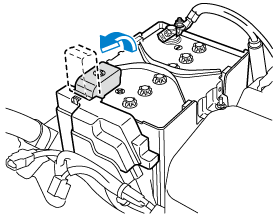Owner Maintenance
Hood
Always check that the hood is closed and securely locked:
A hood that is not closed and securely locked is dangerous as it could fly open while the vehicle is moving and block the driver's vision which could result in a serious accident.
Engine Oil
Changing the engine oil should be performed by an Authorized Mazda Dealer.
Refer to Introduction (Search) for owner's responsibility in protecting your investment.
Recommended Oil
U.S.A., Canada
SKYACTIV-G 2.0 and SKYACTIV-G 2.5
Use SAE 0W-20 engine oil.
Mazda Genuine Oil is used in your Mazda vehicle. Mazda Genuine 0W-20 Oil is required to achieve optimum fuel economy.
For maintenance service, Mazda recommends Genuine Mazda Parts and Genuine Mazda Premium Oil.
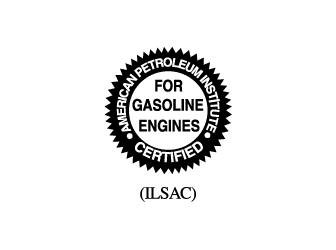
Only use SAE 0W-20 oil “Certified For Gasoline Engines” by the American Petroleum Institute (API).
Oil with this trademark symbol conforms to the current engine and emission system protection standards and fuel economy requirements of the International Lubricant Standardization and Approval Committee (ILSAC), comprised of U.S. and Japanese automobile manufacturers.
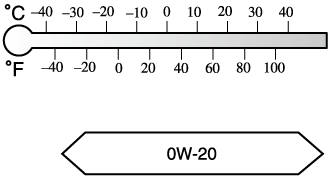
SKYACTIV-G 2.5T
Use SAE 5W-30 engine oil.
Mazda Genuine Oil is used in your Mazda vehicle. Mazda Genuine 5W-30 Oil is required to achieve optimum fuel economy.
For maintenance service, Mazda recommends Genuine Mazda Parts and Genuine Mazda Premium Oil.

Only use SAE 5W-30 oil “Certified For Gasoline Engines” by the American Petroleum Institute (API).
Oil with this trademark symbol conforms to the current engine and emission system protection standards and fuel economy requirements of the International Lubricant Standardization and Approval Committee (ILSAC), comprised of U.S. and Japanese automobile manufacturers.
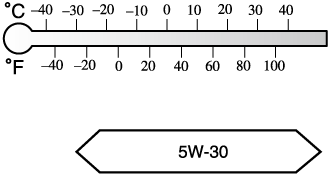
Except U.S.A., Canada
Use SAE 5W-30 engine oil.
Oil container labels provide important information.
A chief contribution this type of oil makes to fuel economy is reducing the amount of fuel necessary to overcome engine friction.
For maintenance service, Mazda recommends Mazda Genuine Parts.
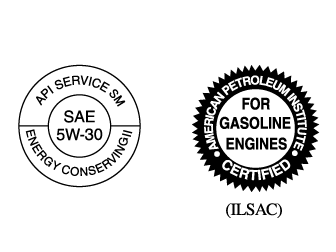
(Mexico)
SKYACTIV-G 2.0 and SKYACTIV-G 2.5
Use API SM or higher, SAE 5W-30 engine oil. If SAE 5W-30 engine oil is not available, use SAE 5W-20, SAE 0W-30 or SAE 10W-30 engine oil.
The quality designation SM, SN or SP must be on the label.

SKYACTIV-G 2.5T
Use API SM or higher, SAE 5W-30 engine oil. If SAE 5W-30 engine oil is not available, use SAE 0W-30 or SAE 10W-30 engine oil.
The quality designation SM, SN or SP must be on the label.
Inspecting Engine Oil Level
-
If the engine oil level warning indication/warning light turns on, add 1 L (0.26 US gal, 0.22 Imp gal) of engine oil.
-
Be sure the vehicle is on a level surface.
-
Warm up the engine to normal operating temperature.
-
Turn it off and wait at least 5 minutes for the oil to return to the oil pan.
-
Pull out the dipstick, wipe it clean, and reinsert it fully.
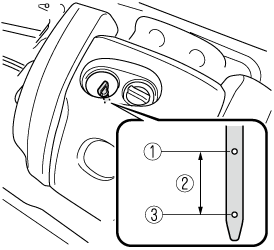
-
MAX
-
OK
-
MIN
-
-
Pull it out again and examine the level.
The level is normal if it is between the MIN and MAX marks.
If it is near or below MIN, add enough oil to bring the level to MAX.
-
Make sure the O-ring on the dipstick is positioned properly before reinserting the dipstick.
-
Reinsert the dipstick fully.
Engine Coolant
Washer Fluid
Replacing Rear Window Wiper Blade
When the wiper no longer cleans well, the blade is probably worn or cracked.
Replace it.
To prevent damage to the wiper arm and other components, do not move the wiper by hand.
-
Remove the cover.
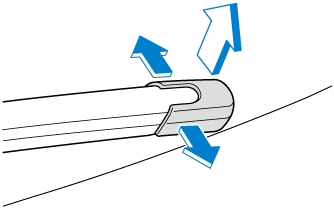
-
Remove the stopper and raise the wiper arm.
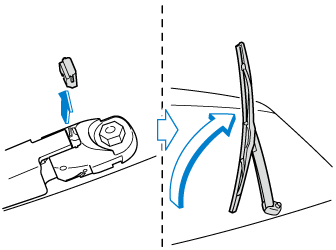
-
Firmly rotate the wiper blade to the right until it unlocks, then remove the blade.
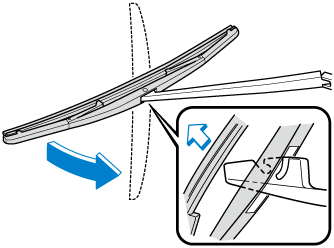
To prevent damage to the rear window, do not let the wiper arm fall on it.
-
Pull down the blade rubber and slide it out of the blade holder.
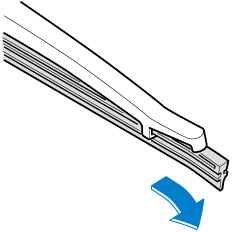
-
Remove the metal stiffeners from the blade rubber and install them in the new blade.

-
Carefully insert the new blade rubber.
Then install the blade assembly in the reverse order of removal.
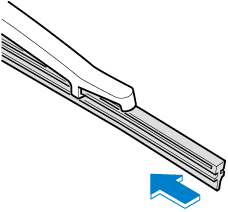
Battery
Wash hands after handling the battery and related accessories:
Battery posts, terminals and related accessories contain lead and lead compounds, chemicals known to the State of California to cause cancer and reproductive harm.
 Read the following precautions carefully before using the battery or inspecting to ensure safe and correct handling:
Read the following precautions carefully before using the battery or inspecting to ensure safe and correct handling:
 Always wear eye protection when working near the battery:
Always wear eye protection when working near the battery:
Working without eye protection is dangerous. Battery fluid contains SULFURIC ACID which could cause blindness if splashed into your eyes. Also, hydrogen gas produced during normal battery operation, could ignite and cause the battery to explode.
 Wear eye protection and protective gloves to prevent contact with battery fluid:
Wear eye protection and protective gloves to prevent contact with battery fluid:
Spilled battery fluid is dangerous.
Battery fluid contains SULFURIC ACID which could cause serious injuries if it gets in eyes, or on the skin or clothing. If this happens, immediately flush your eyes with water for 15 minutes or wash your skin thoroughly and get medical attention.
 Always keep batteries out of the reach of children:
Always keep batteries out of the reach of children:
Allowing children to play near batteries is dangerous. Battery fluid could cause serious injuries if it gets in the eyes or on the skin.
 Keep flames and sparks away from open battery cells and do not allow metal tools to contact the positive (+) or negative (-) terminal of the battery when working near a battery. Do not allow the positive (+) terminal to contact the vehicle body:
Keep flames and sparks away from open battery cells and do not allow metal tools to contact the positive (+) or negative (-) terminal of the battery when working near a battery. Do not allow the positive (+) terminal to contact the vehicle body:
Flames and sparks near open battery cells are dangerous. Hydrogen gas, produced during normal battery operation, could ignite and cause the battery to explode. An exploding battery can cause serious burns and injuries. Keep all flames including cigarettes and sparks away from open battery cells.
 Keep all flames and sparks away from open battery cells because hydrogen gas is produced from open battery cells while charging the battery or adding battery fluid:
Keep all flames and sparks away from open battery cells because hydrogen gas is produced from open battery cells while charging the battery or adding battery fluid:
Flames and sparks near open battery cells are dangerous. Hydrogen gas, produced during normal battery operation, could ignite and cause the battery to explode. An exploding battery can cause serious burns and injuries. Keep all flames including cigarettes and sparks away from open battery cells.
Key Battery Replacement
Key Battery Replacement
If the buttons on the transmitter are inoperable and the operation indicator light does not flash, the battery may be dead.
Replace with a new battery before the transmitter becomes unusable.
-
Make sure the battery is installed correctly. Battery leakage could occur if it is not installed correctly.
-
When replacing the battery, be careful not to touch any of the internal circuitry and electrical terminals, bend the electrical terminals, or get dirt in the transmitter as the transmitter could be damaged.
-
There is the danger of explosion if the battery is not correctly replaced.
-
Dispose of used batteries according to the following instructions.
-
Insulate the plus and minus terminals of the battery using cellophane or equivalent tape.
-
Never disassemble.
-
Never throw the battery into fire or water.
-
Never deform or crush.
-
-
Replace only with the same type battery (CR2032 or equivalent).
The following conditions indicate that the battery power is low:
-
A message, “Low Key Fob Battery. Replace Battery” is displayed on the multi-information display when the ignition is switched OFF.
-
The system does not operate and the operation indicator light on the transmitter does not flash when the buttons are pressed.
-
The system's operational range is reduced.
Incorrect battery replacement operation may damage the key. Replacing the battery at an Authorized Mazda Dealer is recommended. If replacing the battery by yourself, follow the instruction.
Replacing the key battery
-
Remove the lower cover while sliding the knob in the direction of the arrow.
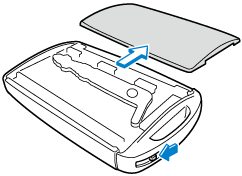
-
Press in the tab to unlock the upper cover.
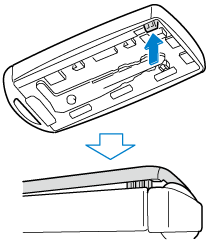
-
Insert a tape-wrapped flathead screwdriver into the gap and slide it in the direction of the arrow.
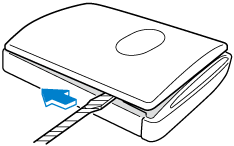
-
Twist the flathead screwdriver in the direction of the arrow and remove the upper cover.
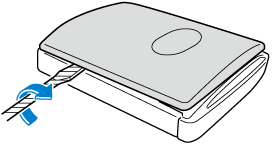
-
Remove the cap using the tape-wrapped flathead screwdriver.
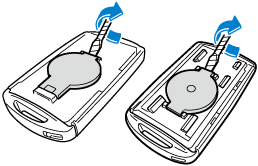
-
Remove the battery using tape-wrapped flathead screwdriver.
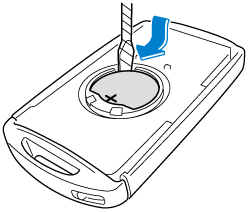
-
Insert a new battery into the transmitter so that the positive pole is facing up.
-
Install the cap.

-
Install the upper cover.
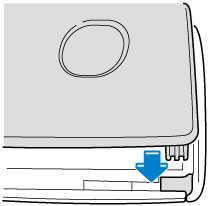
-
Insert the tabs of the lower cover into the slots of the transmitter and install the lower cover.
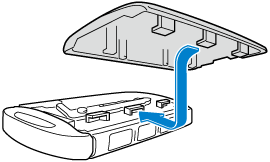
Tires
Tire Inflation Pressure
Always inflate the tires to the correct pressure:
Overinflation or underinflation of tires is dangerous. Adverse handling or unexpected tire failure could result in a serious accident.
Refer to Tires (Search).
Use only a Mazda-genuine tire valve cap:
Use of a non-genuine part is dangerous as the correct tire air pressure cannot be maintained if the tire valve becomes damaged. If the vehicle is driven under this condition, the tire air pressure will decrease which could result in a serious accident. Do not use any part for the tire valve cap that is not a Mazda-genuine part.
Inspect all tire pressures monthly (including the spare) when the tires are cold. Maintain recommended pressures for the best ride, handling, and minimum tire wear.
Refer to the specification charts (Search).
-
Always check tire pressure when tires are cold.
-
Warm tires normally exceed recommended pressures. Do not release air from warm tires to adjust the pressure.
-
Underinflation can cause reduced fuel economy, uneven and accelerated tire wear, and poor sealing of the tire bead, which will deform the wheel and cause separation of tire from rim.
-
Overinflation can produce a harsh ride, uneven and accelerated tire wear, and a greater possibility of damage from road hazards.
Keep your tire pressure at the correct levels. If one frequently needs inflating, have it inspected.
Replacing Light Bulbs
All the light bulbs are the LED type.
The LED bulb cannot be replaced as a single unit because it is an integrated unit.
The LED bulb has to be replaced with the unit. If a replacement is necessary, consult an Authorized Mazda Dealer.
Fuses
Fuse Panel Description
Fuse block (Engine compartment)
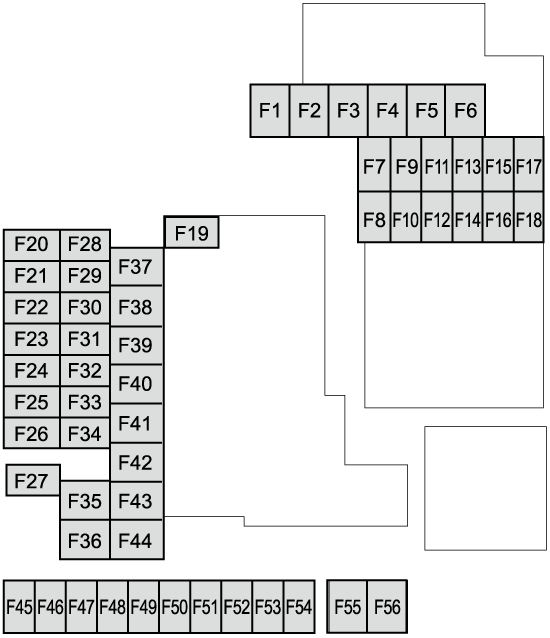
|
No. |
FUSE RATING |
PROTECTED COMPONENT |
|---|---|---|
|
F1 |
― |
― |
|
F2 |
20 A |
Windshield wiper de-icer (Some Models) |
|
F3 |
30 A |
Engine control system |
|
F4 |
20 A |
S-VT |
|
F5 |
40 A |
Engine control system |
|
F6 |
― |
― |
|
F7 |
20 A |
Fuel pump |
|
F8 |
15 A |
Engine control system |
|
F9 |
15 A |
Transmission control system |
|
F10 |
15 A |
Engine control system |
|
F11 |
7.5 A |
Air conditioner |
|
F12 |
15 A |
Engine control system |
|
F13 |
― |
― |
|
F14 |
20 A |
Front seat warmer (Some Models) |
|
F15 |
― |
― |
|
F16 |
15 A |
For protection of various circuits |
|
F17 |
― |
― |
|
F18 |
15 A |
For protection of various circuits |
|
F19 |
60 A |
Power steering system |
|
F20 |
15 A |
Headlight (LH) 1 |
|
F21 |
15 A |
Headlight (RH) 1 |
|
F22 |
15 A |
Keyless system |
|
F23 |
30 A |
ABS, Dynamic stability control system |
|
F24 |
15 A |
Headlight (LH) 2 |
|
F25 |
15 A |
Headlight (RH) 2 |
|
F26 |
7.5 A |
On board diagnostics |
|
F27 |
25 A |
For protection of various circuits |
|
F28 |
25 A |
For protection of various circuits |
|
F29 |
15 A |
Windshield washer |
|
F30 |
15 A |
Accessory sockets |
|
F31 |
15 A |
Horn |
|
F32 |
15 A |
Headlights |
|
F33 |
― |
― |
|
F34 |
― |
― |
|
F35 |
50A |
ABS, Dynamic stability control system |
|
F36 |
― |
― |
|
F37 |
40 A |
Rear window defogger |
|
F38 |
50 A |
For protection of various circuits |
|
F39 |
― |
― |
|
F40 |
40 A |
Air conditioner |
|
F41 |
― |
― |
|
F42 |
20 A |
Windshield wipers |
|
F43 |
30 A |
Cooling fan (Some Models) |
|
F44 |
30 A |
Starter |
|
F45 |
10 A |
Engine control system |
|
F46 |
15 A |
Audio |
|
F47 |
15 A |
For protection of various circuits |
|
F48 |
7.5 A |
Air bag |
|
F49 |
15 A |
Instrument cluster |
|
F50 |
15 A |
Room light |
|
F51 |
25 A |
Audio |
|
F52 |
10 A |
Moonroof (Some Models) |
|
F53 |
15 A |
Engine control system |
|
F54 |
15 A |
i-ACTIVSENSE |
|
F55 |
― |
― |
|
F56 |
15 A |
Electric water pump (Some Models) |
Fuse block (Left side)
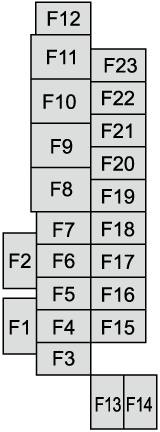
|
No. |
FUSE RATING |
PROTECTED COMPONENT |
|---|---|---|
|
F1 |
― |
― |
|
F2 |
― |
― |
|
F3 |
― |
― |
|
F4 |
15 A |
Power door locks (Driver) |
|
F5 |
15 A |
Power door locks (Passenger) |
|
F6 |
― |
― |
|
F7 |
25 A |
Power liftgate (Some Models) |
|
F8 |
― |
― |
|
F9 |
30 A |
Power windows (Driver) |
|
F10 |
30 A |
Power windows (Passenger) |
|
F11 |
30 A |
Power seat (Driver) (Some Models) |
|
F12 |
― |
― |
|
F13 |
15 A |
Audio |
|
F14 |
― |
― |
|
F15 |
15 A |
Liftgate lock |
|
F16 |
15 A |
Illumination |
|
F17 |
10 A |
Brake lights |
|
F18 |
10 A |
Reverse lights |
|
F19 |
10 A |
Rear turn signal lights |
|
F20 |
10 A |
Taillights |
|
F21 |
10 A |
Taillights |
|
F22 |
7.5 A |
Air bag (Some Models) |
|
F23 |
― |
― |










































